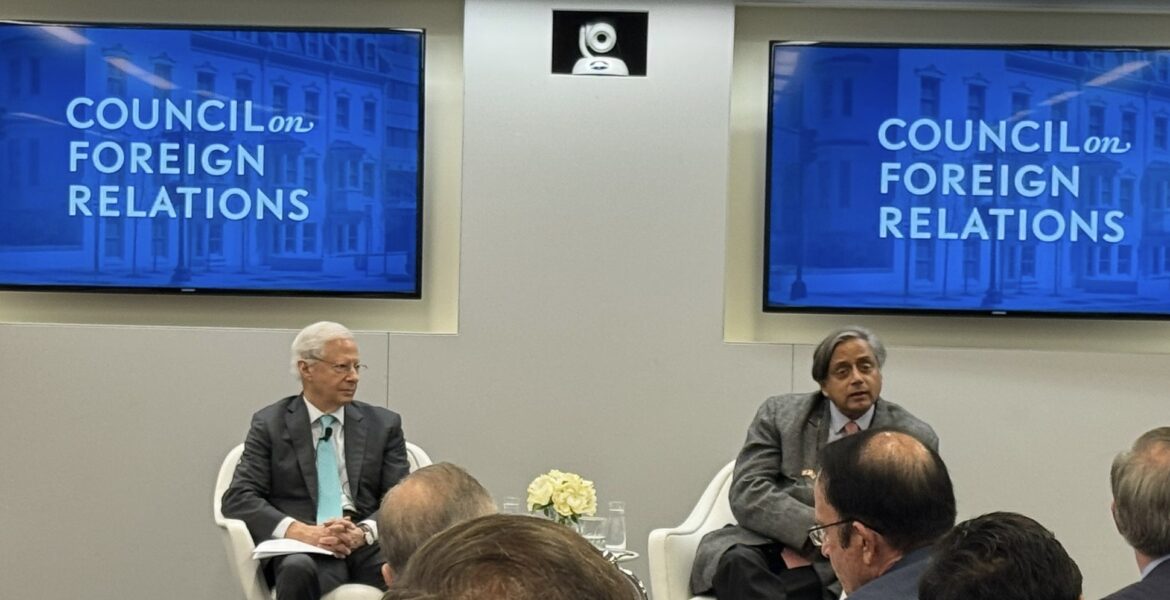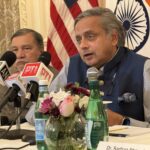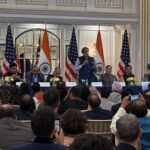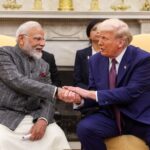Amid rising international concern over potential “nuclear brinkmanship” following the April 22 terrorist attack in Pahalgam, Indian Member of Parliament Shashi Tharoor sought to allay fears of any imminent escalation between India and Pakistan. Leading an All-Party Parliamentary Delegation, Tharoor remarked, “I think what happened was so far short of anything remotely approaching a nuclear threshold that the proposition, frankly, is laughable.”
Tharoor made these remarks during a conversation with former U.S. Ambassador to India, Kenneth Juster, at the Council on Foreign Relations in Washington D.C., on June 5, 2025.
“Our Pakistani friends, I think like to dangle this nuclear bogey to get all of you excited and anxious,” added Tharoor. “We’ve got a nuclear power engaged in the war right now for two-and-a-half years in Europe, and no one has talked about nukes yet. I mean, why would two-and-a-half-days in India suddenly lead to fears of nuclear escalation?”
Tharoor referenced historical context, pointing out that India and Pakistan have fought four wars since becoming nuclear powers, including the Kargil conflict of 1999, which lasted nearly a month. “This nuclear thing is a bogeyman, and I would urge people not to worry,” he said, asking rhetorically, “why would anyone assume that is the first option for India?”
He reiterated India’s commitment to a “no-first use” nuclear doctrine and clarified that India would “never brandish a nuclear threat,” unlike Pakistan, which has not adopted a similar policy. According to Tharoor, India’s actions posed no “existential threat” to Pakistan and were limited to “calibrated retribution” and punitive measures against terrorist elements.
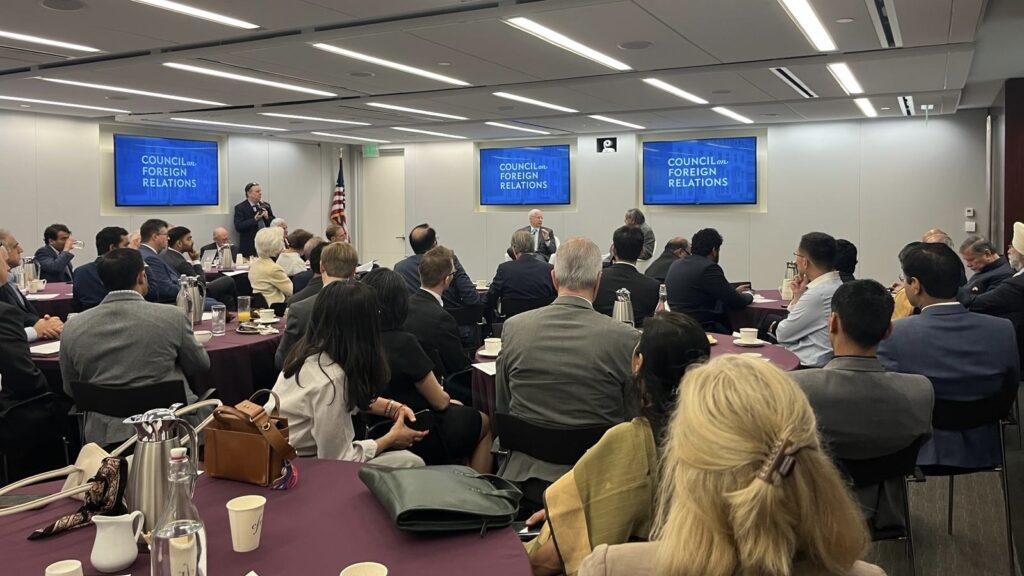
Addressing a question about U.S. involvement in facilitating a ceasefire, Tharoor said, “I think that if anyone needed persuading to stop, it was the Pakistanis… I’m not privy to what happened between the US and Pakistan, but I wouldn’t be surprised if some of the messaging from here [US] resulted in precisely what you’re suggesting. We [India] didn’t need persuading.”
When asked if the United States should mediate in such conflicts of stay the “heck out of it,” Tharoor replied, “I would never presume to tell the US to stay the heck out of anything it wants to get involved in. But mediation is not a term that we are particularly willing to entertain.”
He speculated that the U.S. likely played a role to monitor conversations on both sides. “Certainly, my government received a number of calls at the highest levels from the US government, and we appreciated their concern and their interest,” he said, adding that similar outreach was likely made to Pakistani officials.
Tharoor emphasized that India’s initial strike was “purely retribution” and did not target civilian or military installations. India just hit terror camps designated as terrorist organizations by the United Nations and the US State Department, he said.
Addressing the purpose of his delegation’s diplomatic engagements across Americas, Tharoor emphasized that the global outreach is not unprecedented. He cited historical precedents, including the global diplomatic push initiated by Prime Minister Manmohan Singh in the aftermath of the 2008 Mumbai attacks, and the outreach efforts by Prime Minister Indira Gandhi in 1971, who dispatched even her “foremost critics” abroad to articulate India’s concerns over the Bangladesh refugee crisis.
Tharoor also referenced the 1994 initiative by then Prime Minister P.V. Narasimha Rao, who invited the Leader of the Opposition to head the Indian delegation during a pivotal UN debate on Kashmir at the Human Rights Commission in Geneva.
“It’s a good reflection on Indian democracy. That old line about your political differences stop at the water’s edge is true for us too,” Tharoor noted. “Once we cross our borders, we are one.”
He acknowledged that the anger in India was “palpable” and he himself authored an op-ed urging the government to “hit hard but hit smart.” He added, “That’s exactly what the government did,” describing the precision strike on nine terrorist targets that caused no collateral damage.
“We just wanted retribution against the terrorists… as far as we’re concerned, we’re done. But if you hit back, we will have no choice but to retaliate,” he said, reiterating that India remains focused on development and economic growth, not prolonged conflict.
Tharoor also addressed military technologies used by Pakistan during the conflict, highlighting that 81 percent of Pakistan’s defense systems are sourced from China. He remarked humorously that “Defense” is the wrong term, calling them “Offense systems” that make up “pretty much everything, sort of at the cutting edge that Pakistan possesses.”
Responding to contrasting war narratives in Indian and Pakistani media, Tharoor pointed to the rise of misinformation on social media. He called some viral posts “natural stupidity,” noting absurd claims like India bombing Karachi or taking over Islamabad.
To counter misinformation, he said India’s Foreign Secretary Vikram Misri, along with two military officers, both women, one of whom is Muslim, held regular, fact-based briefings. “Just to make it very clear, this is not India, Pakistan, or Hindu-Muslim… It is united India against terror,” he said.
A lighter moment came when his son, Ishaan Tharoor, a journalist with The Washington Post, stood up to ask a question. “That shouldn’t be allowed, he is my son,” Tharoor joked, drawing laughter from the audience. Ishaan clarified that he was speaking in a personal capacity and “mostly to say hi” before the senior Tharoor heads of off to his next engagement.
When asked whether foreign governments had requested evidence of “Pakistan’s culpability,” Tharoor replied, “I didn’t plant it,” before quipping, “I promise you this guy does this to his dad.”
He said that while no governments asked for proof, media organizations in three places did. “Let me say very clearly that India would not have done this without convincing evidence,” he affirmed.


